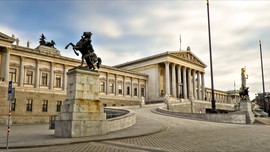Italy’s Five Star Movement (Movimento 5 Stelle, M5S) has both a short and a long history. Let’s begin with the short history.
It is part of a broad phenomenon called anti-establishment ideology, which is the backbone of populism. Populism is, and wants to be, a politics of presentism and vicinity, though in a purely visual and audience-oriented way, rather than in the aspiration by the people to take decisions directly; it blurs whatever interposes itself between the people and the marker of people’s representation. This is what the M5S and also the Spanish Podemos endeavored to achieve: these daring and spectacular cases of populist uprising challenged mainstream parties, both from the left (Podemos) and from a more moderate stance (M5S), trying to create a democratic movement that could give the government back to the people through direct representation without organized parties. No one can, however, foresee the future and anticipate what these “non-party parties” would really do if they won the majority of votes, and succeeded in forming a government.
The co-founders of the Five Star Movement, Beppe Grillo and the late Gianroberto Casaleggio, claim there is a war going on between the “old world” and the “new world”. The old world stands for party democracy, partisan politics and political representation; the new one stands for citizens connected horizontally through the Internet, without intermediary organizations or any divisions between “inside” and “outside”. What makes the claim of the M5S so radical is not so much the – in my opinion – reasonable desire to make the Internet a means for deepening participation, but its battle against the establishment and quest for the elimination of partisan competition and political deliberation among parties. This is what makes the M5S a “non-party party” with the myth of “objectivity”. Opposition against the establishment is thus an opposition against organized parties and professional journalism, which have become the modern “intermediary bodies” that make representative government possible.
In the 1990s, Beppe Grillo – already known to the large public as a comedian – deserted national television and reinvented his career as a radical critic of Tangentopoli, through his performances in theatres and during street demonstrations. Speaking in the name of “ordinary citizens” (la gente), rather than the more political “the people” (which suggests we must define his movement as gentismo), his denunciation of “the casta” was successfully disseminated through satire and rhetoric. By 2005 he had moved from being a soapbox speaker to a real political agitator. This was in no small part due to the creation of a personal blog, beppegrillo.it, an operation at the forefront of communication management and digital marketing.
The non-party party called Movimento 5 Stelle was founded in 2009, as an Internet-based movement with its own newsletter. The name and logo of the movement were registered at the Chamber of Commerce in Milan, which was meant to stress its nature as a fully private association; the movement wanted to be a civil association, not a traditional political party. Its strategy consisted not so much in the attempt to increase participation, but in bypassing parties and traditional media, thus transforming Italian democracy into a bottom-up and outside-in type of government. Grillo combined two kinds of forum, the physical and the virtual piazza, and made direct participation through the expression of opinions the engine of a new movement of contestation and participation. His final goal was to overcome particracy and create a non-partisan democracy. The selection, for example, of candidates via CV (for the first time during the local elections of 2012) wanted to be (and was) a frontal attack against the oligarchic methods used by traditional parties.
We can now turn to the long history. The intellectual and moral inspirer of the M5S, Casaleggio, coupled populism with direct democracy, and declared himself “proud of being a populist along with thousands and thousands of populists […] People working in the institutions have the duty to serve the people, they cannot be above the popular will. We are thus trying to introduce new instruments of direct democracy in a country where there is no democracy.” Imbued with Adriano Olivetti’s visionary conception of a corporate, non-party and technocratic democracy (Casaleggio began his career in Olivetti’s vanguard computer firm), Casaleggio pursued the dream of liberating Italian citizenry from political parties and the “fake news” produced by established media. He and Grillo thus created a movement that wanted to be an amalgam of different styles of political practices, which:
a) pivoted on the direct interaction with citizens’ opinions, by using both “heavy” (face to face) and “light” (via the Internet) forms of gathering;
b) relied solely upon individual bloggers and opinion movements.
We tend to forget that two different actors constituted Italian democracy from the very beginning: parties (post-fascist and anti-fascist political parties), and anti-parties. The difference between the general elections of 1948 and 2018 lies in the fact that, in the past, anti-partyism played a peripheral role; nowadays it is a style of, and thinking about, politics that has somehow become the common denominator of all parties (or what remains of them). The success of the M5S among the Italian (voting) public represents this trajectory from party democracy to post-party democracy quite well; in addition, it marks the split between the general public, on one hand, and established media and politicians, on the other. This is one of the main reasons why Italian commentators are unable to analyze this movement and phenomenon dispassionately -- indeed, they are among the targets of the movement.

70 years of Italian democracy have consolidated the public sentiment against parties and the party form of political participation. The upcoming general election of March 4th promises to be a triumph of anti-partyism, both in the style of populist rhetoric that frames the electoral campaign (which more or less all candidates indulge in) and in the project of a post-party democracy (which is explicit in the programme of one party list in particular). M5S is an example of the party system’s ineptitude to amend itself and stop its corrupting decline, as well as the mirror of democracy’s self-exploration and experimentation, which can hardly be stopped and is unavoidably risky. Representative democracy proves inadequate in governing a society that no longer relies upon structural organizations of workers and citizens; it perpetuates a rampant political corruption, which institutional legitimacy is unable to contain and correct. Italy is therefore an interesting crucible of an epochal change in representative democracy, a party system that has reached the line separating it from factional politics and populism. This is the context in which we must situate the Five Star Movement.
The combination of a plebiscite through the Internet, and Internet communication and news dissemination, may have been the most original (though not really successful) contribution Grillo has made to democratic politics, but it was not the only one. From the beginning, Grillo has aimed at something more ambitious: to make his blog a political actor in the fullest sense of the word, thus playing a mixture of old and new roles. Also, the Five Star Movement’s method claimed (unsuccessfully) to be entirely public and transparent, and live broadcasting was the technique it adopted when deliberation was needed, locally and nationally.
In a few months’ time, the blog became a political movement. Without changing its non-party identity, beppegrillo.it gave birth to an electoral party. The M5S platform did not claim total horizontality, though, but “democratic meritocracy”, or candidacies and distribution of functions in relation not to party membership but competence only; more than the authority of the experts (technocracy) it is in effect the myth of a positivist objectivity that characterizes M5S. I would therefore propose to coin the term objectocracy. Before becoming the engine of the M5S, Grillo’s blog was a platform that collected and diffused news; it vindicated a “true” or “objective” assessment of problems against opinionated media and established journalism. The myth of objectivity was, from the beginning, a distinctive mark of the movement and, as mentioned above, a possible implication of anti-partyism. Based on the potential of the Internet, among the ambitions of this post-party populism was the essential goal of dismantling parliamentary politics (Grillo’s attacks, for example, on free mandate representation have been persistent in these years).
It is a fact, though, that as soon as the movement became more involved in local administrations and national institutions, it had to face a number of pragmatic choices that the movement (namely Grillo) had always refused to make: building a better organization; defining a governing programme; and devising effective decision-making procedures (e-voting without quorum means that only a minority of those enrolled in the blog generally takes part in the voting process). These several unsolved problems demonstrate what Schattschneder famously wrote in 1942: that modern democracy is “unthinkable” without parties. The question is indeed what kind of party.
Most of the criticisms made against the M5S point to the fatal personalization of the leadership in a movement that is de facto turning into a party, however without admitting this to itself. It thus fails to design an organization that can monitor leader(s) and, moreover, prevent fake participation in decision-making processes. Margaret Canovan’s paradox of the inability of populism to reconcile redemptive democracy with pragmatic democracy finds perfect confirmation in the M5S, which cannot solve this problem without changing itself: it cannot, in fact, cultivate the ambition of creating a direct, digital democracy without party organization.
Another domain in which M5S has fostered innovation is information and opinion formation. From the start, Grillo has advocated the “liberation” of opinion formation from established media and from the information industry, in the name of horizontal journalism. Beppegrillo.it thus claimed to be the most reliable source of information; official media channels were bypassed and declared unreliable, while professional journalists appeared as the remnants of an ancient monopolistic system of opinion-making in the service of the establishment. The impact of de-professionalized journalism is still hard to evaluate and goes beyond the experience of Grillo’s movement, but it promises to become one of the most important factors in the process of the transformation of representative democracy and party systems.
The questions posed by Grillo and his movement are however relevant. Not only has he denounced the fact that not all citizens have equal access to the marketplace of ideas; he has also addressed the problem that some citizens, or groups of citizens, have a louder voice than others because of the material wealth they possess and employ in order to amplify their voice, thus more easily furthering their agendas. Technological means of communication require money, and money brings fatally private interests and economic disparities into politics. In Italy like in all other democratic countries, therefore, equality has been breached in a substantial way, and this represents a major challenge for political freedom, whether we like Grillo’s movement or not.

Riproduzione riservata



